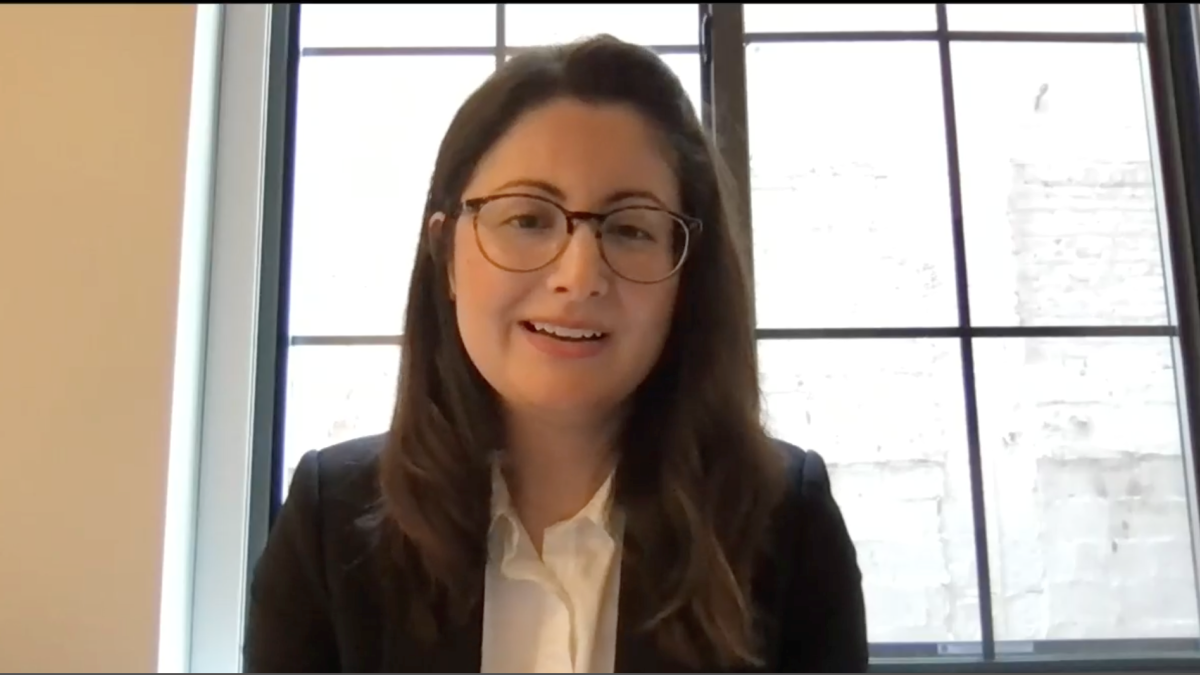ASU alum testifies before US Senate Judiciary Committee on DACA, her American dream

Former Arizona State University student Dalia Larios testified before the United States Judiciary Subcommittee on Immigration, Citizenship, and Border Safety on June 14.
Last week, Arizona State University alumna Dalia Larios testified before the United States Judiciary Subcommittee on Immigration, Citizenship, and Border Safety about her personal experience as a Deferred Action for Childhood Arrivals recipent.
Sen. Alex Padilla of California called the hearing to commemorate the 10th anniversary of the Deferred Action for Childhood Arrivals (DACA) and more than 20 years that have passed since the first introduction of the DREAM Act.
The testimonials were designed to reinforce the need for a permanent solution for young, undocumented immigrants and increase international STEM-focused talent needed to drive innovation and demand in the United States.
“We urgently need to expand DACA and codify permanent protections for dreamers into federal law," Padilla said. "In order to maintain a healthy and competitive workforce, we must vote, foster the talents of young Americans and do more to attract and retain the best and brightest minds from around the world, and that begins with us addressing immigration policy.”
The hearing, which featured testimony from Larios and two other experts, took place June 14 at the Dirksen Senate Office Building in Washington, D.C.
Larios testified virtually about her personal story as an undocumented immigrant and the impact of DACA on her life. She first came to the United States at the age of 10 and embarked on her resilient journey to pursue a career in medicine. She also reflected on the daily reality of countless immigrants who experience fear and family separation.
“The thought of deportation is exceptionally painful to bear. Most days, I don’t allow myself to think about it; it would mean losing everything and everyone I know,” Larios said in her testimony. She received a degree in biological sciences from ASU in 2012.
Larios, who is currently a resident doctor treating cancer patients at Massachusetts General Hospital and Brigham and Women’s Hospital’s Harvard Radiation Oncology Program, commented on how she grew up seeing her mother, a housekeeper, and father, a construction worker, struggle — and, ultimately, how they motivated her to strive for success.
While Larios graduated summa cum laude from ASU, she too felt the need to work just as hard due to the high costs of her desired medical career and her legal status as an undocumented worker.
Then, when DACA was created in 2012, Larios was able to take a gap year to work and earn money to pay for the medical school application process. By 2019, she became the first DACA recipient to graduate Harvard Medical School with honors.
“Although I'm proud that the program continues to stand today,” she said, “I'm disappointed that even after a decade, our future is still uncertain, and our anxieties around deportation have not been abated.”
When asked by committee member Sen. John Cornyn of Texas whether providing stability for DACA recipients or providing employment-based green cards for people with advanced degrees should be a priority, Larios emphasized how important it is for all immigrants to have the same opportunities.
“I personally don't consider myself more deserving than anyone else,” she said. “I think that Congress should approach this in a comprehensive manner, thinking about the fact that lives are at stake here. This is a topic that extends beyond just a piece of paper, that it's somebody's livelihood that we're talking about.”
Larios pointed to a June 2020 report by the Association of American Medical Colleges (AAMC) to make the case for the essential role that immigrants have played during the global pandemic in the health care field — a time that also projects a shortage of 124,000 physicians within the next 12 years. As a physician, she added, she worries about the impact that shortage will have on patients she and her colleagues care for.
“There’s nearly 30,000 DACA recipients in health care and about 200 medical students and residents who again have (been impacted by) DACA,” Larios said. “If you look at those nearly 200 medical students and residents, they will touch the lives of 1.7 to 5.1 million patients.”
Larios was asked by Sen. Amy Klobuchar of Minnesota for her opinion on a viable, long-term pathway to awarding permanent status to DACA students.
“Something to emphasize about a lot of these issues is, at least for DACA (recipients) … we live two years at a time. We apply, we cross our fingers, hold our breath and hope that there's an acceptance on the other side, but living like this is not a life,” Larios said.
Watch the full testimony on the Senate Judiciary Committee website and read her written statement here.
More Law, journalism and politics
Can elections results be counted quickly yet reliably?
Election results that are released as quickly as the public demands but are reliable enough to earn wide acceptance may not…
Spring break trip to Hawaiʻi provides insight into Indigenous law
A group of Arizona State University law students spent a week in Hawaiʻi for spring break. And while they did take in some of the…

LA journalists and officials gather to connect and salute fire coverage
Recognition of Los Angeles-area media coverage of the region’s January wildfires was the primary message as hundreds gathered at…

